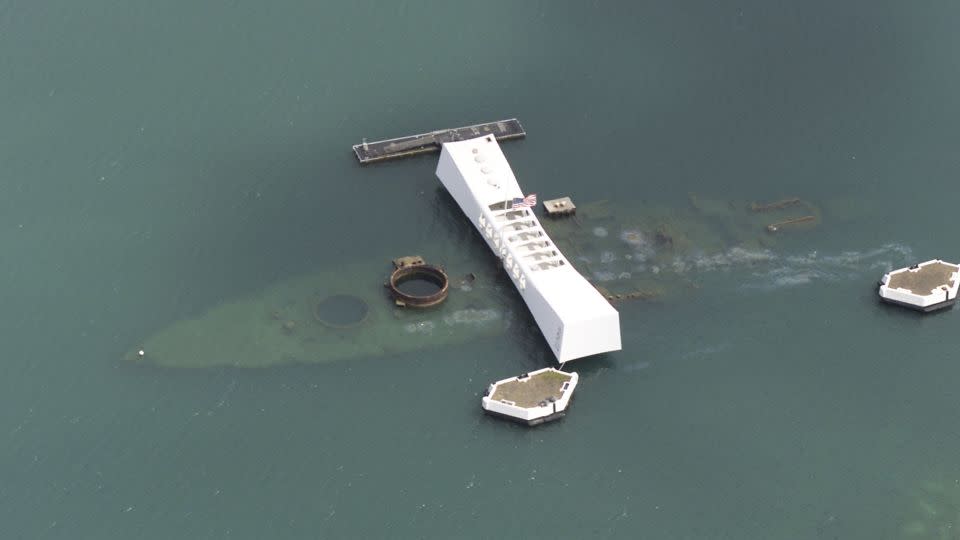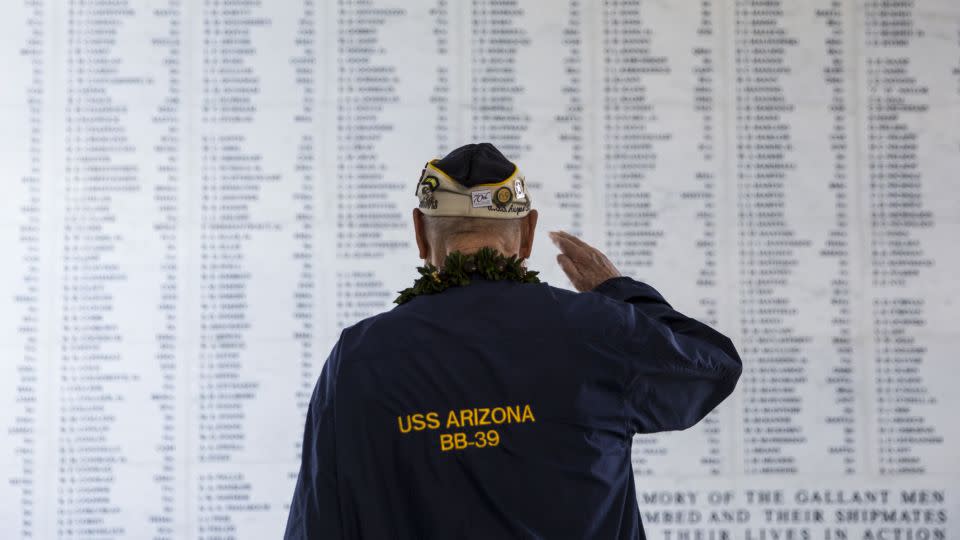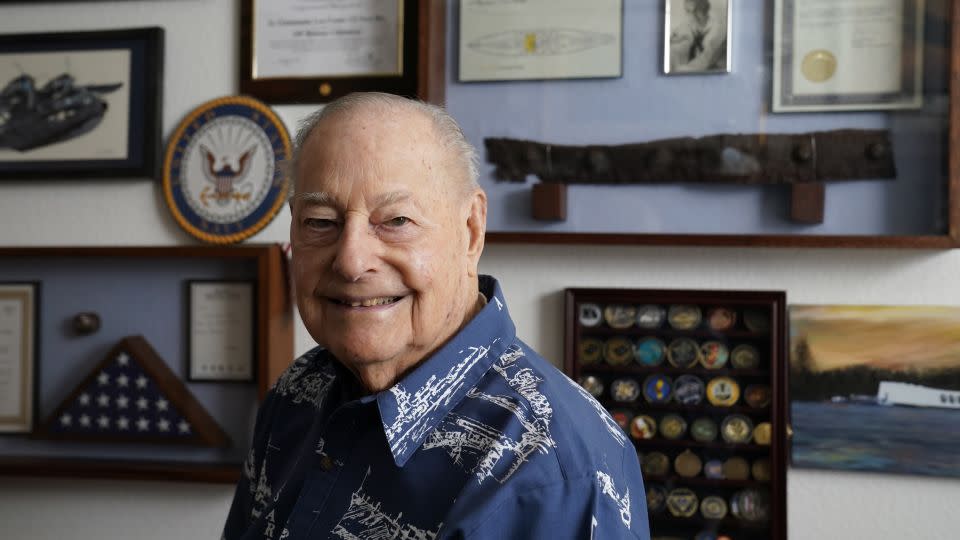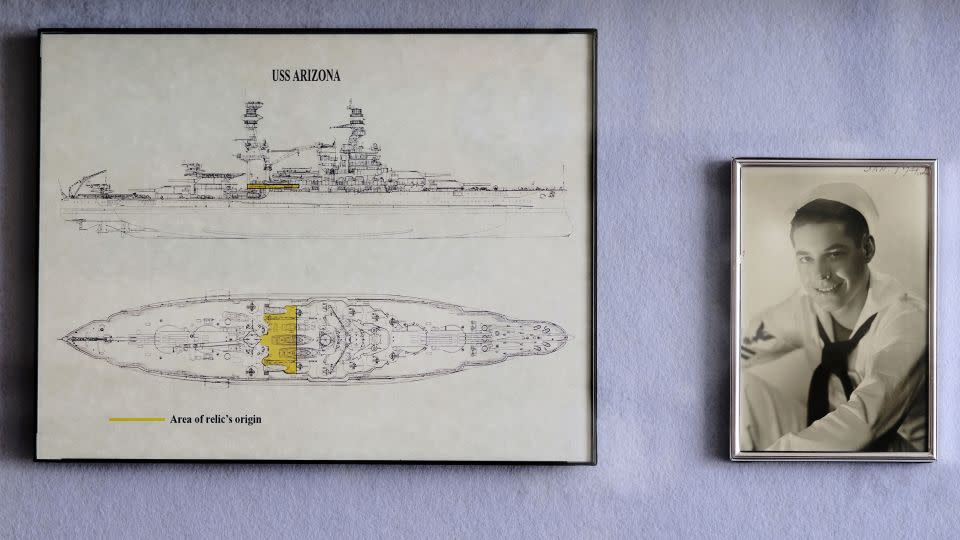Lou Conter, last survivor of USS Arizona in Pearl Harbor attack, dies at 102
Lou Conter, the final survivor of the USS Arizona, the Navy battleship that was sunk – with a loss of 1,177 lives – during the surprise Japanese attack on Pearl Harbor, has died at age 102.
Conter was surrounded by family at his home in Grass Valley, California, and passed away peacefully on Monday, according to Joint Base Pearl Harbor-Hickam and Pacific Historic Parks, citing Conter’s daughter Louann Daley.
Through interviews, a book and by attending services, Conter ensured the public remembered the bombing, which blew the battleship 30-40 feet out of the water and left many who survived with horrific injuries.
The veteran, a 20-year-old quartermaster, helped rescue fellow crewmen on the morning of December 7, 1941, which marked the US entry into World War II.
Conter was on the USS Arizona deck “when a Japanese armor-piercing bomb hit one million pounds of gunpowder stored in the ship’s hull,” he detailed in his autobiography “The Lou Conter Story: From USS Arizona Survivor to Unsung American Hero.”

“Guys were coming out of the fire, and we were just grabbing them and laying them down,” Conter told CNN affiliate KCRA in an interview last year. “They were real bad. You would pick them up by the bodies, and the skin would come off your hands.”
The attack lasted an hour and 15 minutes, killing about 2,400 US service members and civilians, along with injuring more than 1,100 people, according to a National WWII Museum facts report and other sources.
Conter was among the 335 Arizona crew members to survive, and he outlived them all – the second to the last survivor was Ken Potts, who died last year in Provo, Utah, at age 102, according to Pacific Historic Parks, which supports the USS Arizona Memorial and other sites.

“This is a heartbreaking loss,” said Aileen Utterdyke, president and CEO of Pacific Historic Parks. “Lou Conter epitomized what it meant to be a member of the Greatest Generation, Americans whose collective courage, accomplishments and sacrifices saved our country from tyranny.
“He had an exemplary career in the Navy and was steadfast in imploring the schools, parents and everyday Americans to always remember Pearl Harbor.”
Funeral arrangements for the veteran are pending, the organization said.
After the Pearl Harbor attack, Conter’s military service grew and he became a VP-11 Black Cat pilot, Pacific Historic Parks said.
The Black Cats conducted operations at night in which they would be hidden in the darkness from enemy ships.
Conter flew several missions with the Black Cats and survived two shootdowns in World War II, including one off the coast of New Guinea in which the crew was surrounded by sharks, according to Pacific Historic Parks.

After World War II, Conter became an intelligence officer, flying combat missions in Korea. He was respected widely in the military intelligence community and was known for helping create the Navy’s first SERE program (survival, evasion, resistance and escape), according to the National WWII Museum in New Orleans.
Conter went on to become a military adviser to Presidents Dwight D. Eisenhower, John F. Kennedy and Lyndon B. Johnson, Pacific Historic Parks said.
After 28 years of service, Conter retired in December 1967, according to the National WWII Museum.
When Conter turned 100, he pinned the pilot wings he’d earned in World War II on his 29-year-old great nephew, US Marine Capt. Ray Daniel Hower, Pacific Historic Parks said. Conter was unable to attend the ceremony but during a keynote speech, Hower said, “We would not enjoy the freedom, opportunity, and prosperity we have today” without Conter’s service and heroism.
Conter was born in northern Wisconsin in 1921, and was the middle child of his family, according to The National WWII Museum.
Conter and his family lived in New Mexico, Denver and Kansas. Just after he turned 18, he enlisted in the Navy.

“They call a lot of us heroes, and I’ve always said we are not the heroes,” Conter told KCRA last year. “Heroes are the ones right there that day that lost their lives.
“They gave everything up. We got back to the States. We got married. We had kids and grandkids. We are still here. They were lost forever right then and there.”
For more CNN news and newsletters create an account at CNN.com

 Yahoo News
Yahoo News 
